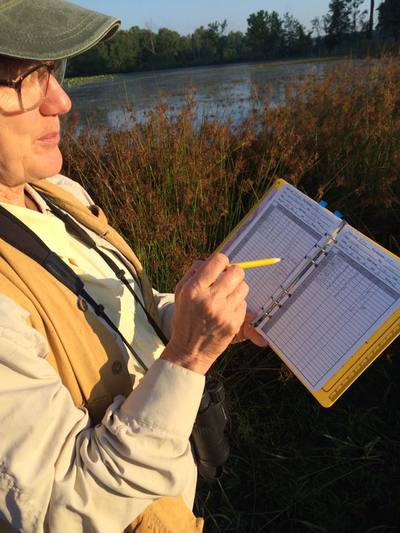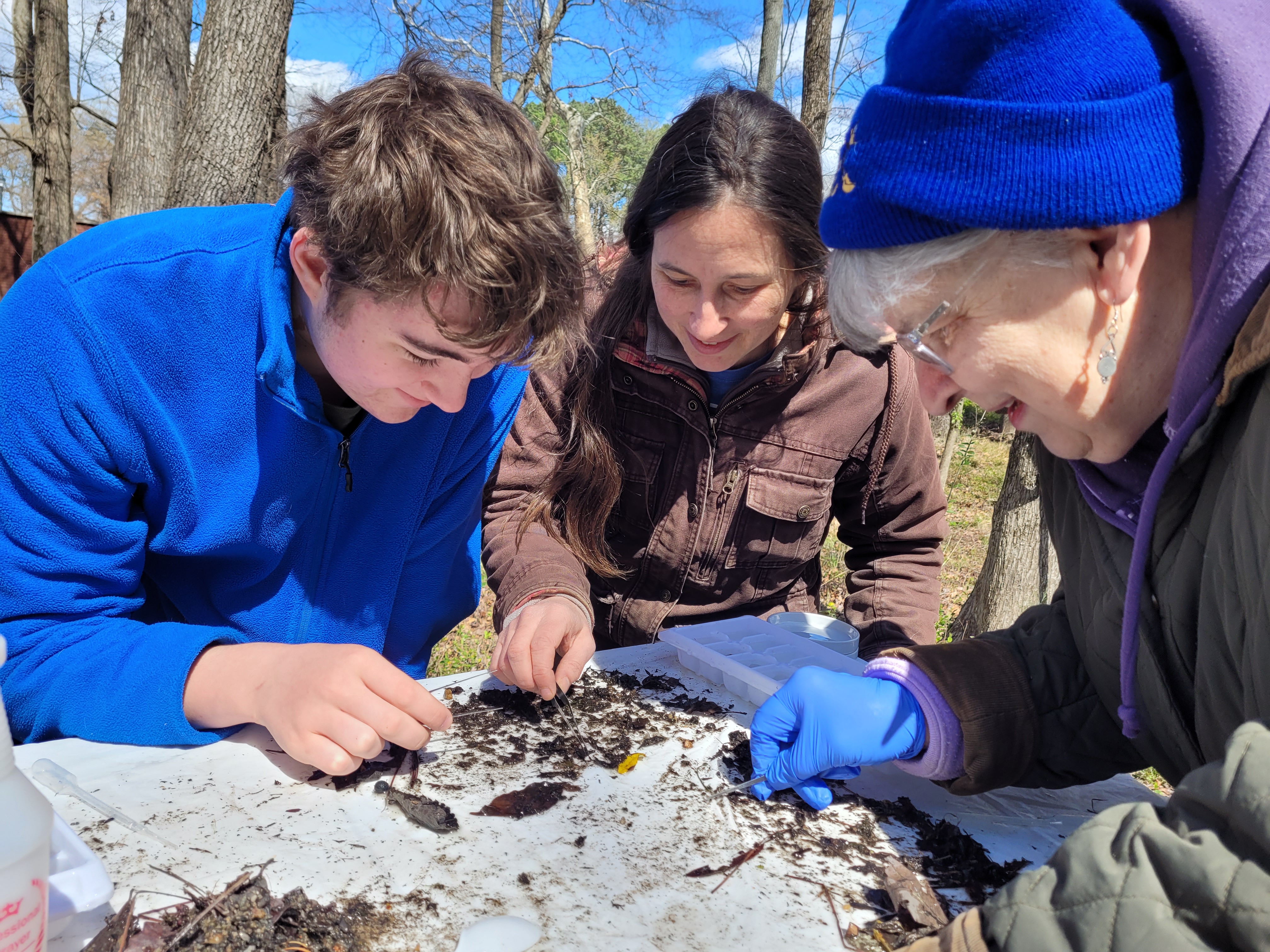
Citizen Science and Research Skills
This page contains numerous curriculum resources that may be used flexibly by Virginia Master Naturalist chapters and trainees to meet their learning needs. These resources also are available to other volunteer programs and the public for their use, but please note that watching or reading these materials cannot substitute for enrolling in and completing a basic training course with a VMN chapter in order to become a Virginia Master Naturalist volunteer.
Thank you to the many people who contributed to the creation of these materials, including Alycia Crall, Priya Jaishanker, Sara Focht, and the many VMN volunteers who provided feedback when we tested these materials.

Learning Objectives
Upon completion of the Virginia Master Naturalist basic training course, participants will be able to:
- Describe the types of field studies (inventory-including BioBlitz, monitoring, and observational & experimental studies) that may be used to investigate populations, communities and ecosystems, and understand when and why these types of studies are used
- Understand the process of science and how it informs natural resource management
- Demonstrate basic field study skills, including observing, field journaling, following protocols, and data recording
- Be familiar with the opportunities for citizen science and other forms of participatory science aligned with the VMN program, with an emphasis on projects focused in Virginia
- Use keys and field guides to identify organisms
- Demonstrate basic map and GPS skills as they would apply to typical participatory science projects
- Understand basic principles of scientific ethics citizen scientists should follow
Introductory Videos
What: Short videos to introduce volunteers to the topic of Citizen Science and Research Skills.
Possible uses:
- Have trainees watch before class as preparation
- Watch as part of class
- Have trainees watch after class as review or supplementary material
- Have existing members watch as a refresher on this topic
RareQuest
This video is an introduction to RareQuest, a citizen science partnership between the Virginia Master Naturalist program and the Virginia Natural Heritage program that was completed in 2016. The videographer was Priya Jaishanker.
Watch on WebsiteYou Can Do Participatory Science
Discover the power of participatory science! Learn how students and people from all over the world are helping scientists by sharing their bird observations. Video by Cornell Lab of Ornithology.
Watch on WebsiteBackground Readings
Most Recommended Readings
- This publication was written for the Idaho Master Naturalist program, but it is highly appropriate for Virginia Master Naturalists as well. Citizen Science: Learning About the World with Science by Sara Focht
Supplemental Readings
Above and Beyond, for those seeking more in-depth information
Note that book publisher websites are provided, but often these books are available from other sources at varying prices.
- Public Participation in Scientific Research: a Framework for Deliberate Design. Full citation: Shirk, J. L., H. L. Ballard, C. C. Wilderman, T. Phillips, A. Wiggins, R. Jordan, E. McCallie, M. Minarchek, B. V. Lewenstein, M. E. Krasny, and R. Bonney. 2012. Public participation in scientific research: a framework for deliberate design. Ecology and Society 17(2): 29.
- Handbook of Citizen Science in Ecology and Conservation, edited by Christopher A. Lepczyk, Owen D. Boyle, and Timothy L. V. Vargo.
- Citizen Science: How Ordinary People are Changing the Face of Discovery by Caren Cooper
- The Rightful Place of Science: Citizen Science, edited by Darlene Cavalier and Eric. B. Kennedy
Online Data Management, Databases, and Other Resources
- iNaturalist: This online tool and app combines the power of social media with nature observation. It is the tool the Virginia Department of Game and Inland Fisheries is using for the WildlifeMapping project. It is also a great tool for recording BioBlitz data; we recommend it for chapters undertaking biodiversity inventories.
- CitSci.org: This online tool is an excellent resource for creating a data repository for monitoring and other citizen science projects. VMN chapters developing a citizen science project can use CitSci.org to host data sheets for participants, allow for online data entry, and even data visualization. CitSci.org is the tool used by the Virginia Vernal Pools project.
- SciStarter: This site is an online clearinghouse of citizen science projects (not specific to natural resources nor Master Naturalists.)
- Association for Advancing Participatory Sciences: This organization connects people from a wide range of experiences around one shared purpose: advancing knowledge through research and monitoring done by, for, and with members of the public. Their resources include an open-access journal, project design tools, educator resources, and more.
Presentation Videos
What: A two-part set of online videos of PowerPoint presentations with narration by Michelle Prysby, Director of the Virginia Master Naturalist program. Combined, they are approximately 25 minutes long.
Possible uses:
- Have trainees watch before class as preparation
- Watch as part of class, combined with hands-on activities
- Have trainees watch after class as review
- Share with instructor to give him/her an idea of the type of material to cover
- Have trainees watch as a make-up for a missed class on the same topic
- Have existing members watch as a refresher on this topic
User Notes: Please note that you can make the video full-screen and toggle the closed captioning on and off. Please also note that these videos are intended to be used in conjunction with the handout provided below. These videos are also available at video.vt.edu: Part 1 and Part 2.
Note for Basic Training Chairs and Course Instructors:
Instructors and basic training chairs for VMN chapters may contact the state office for access to the full Powerpoint file and script. Both the Powerpoint and the script may be used and adapted for your courses. Please pay attention to the image license restrictions listed in the notes section for each slide in the Powerpoint file.
Part 1
Watch on WebsitePart 2
Watch on WebsitePresentation Handout
What: Document to accompany the Presentation Videos or an in-person presentation that summarizes the main points of the presentation.
Possible uses: Provide to the trainees as a reference that they can use later.
Activity Lesson Plans
What: Lesson plan for interactive activities on citizen science and research skills.
Possible uses: These activities can be used during class time to encourage trainees to apply the material they have learned and to break up lecture time with an interactive exercise. The lesson plans are written so that they may be led by non-experts, including VMN volunteers.
Assessment Questions
What: A set of possible assessment questions on this topic for VMN trainees.
Possible uses: Incorporate these questions into written or practical assessments during the course.
Written Assessment Questions
- Choose one of the major categories of natural resource studies (inventory, monitoring, or experimental research). Describe when you would use that type of study and identify one approved project in your chapter that fits into that category.
- List the major steps of the scientific process and provide a short description or example of each one.
- List the essential elements that should be included in every field notebook entry to make it scientifically useful.
- Why is it important to follow scientific ethics standards as a Virginia Master Naturalist? Provide three steps you can take to ensure your participation in a project meets these standards.
Practical Assessment Questions/Activities
- Identify a sample using a dichotomous key. This could be a twig and leaf sample from a tree, a wildflower sample, or any number of other kinds of organisms, as long as there is a simple key provided.
- Create a field journal entry. It should have all essential elements along with additional observations and/or sketches.
- Use the Better Impact Volunteer Management System to find one approved citizen science project in the chapter. Use all available resources to locate information on that project, including how to participate and specific protocols that must be followed.
- Give a 2-minute informal talk about any citizen science project relating to Virginia’s natural resources.
- Using a topographical map or GPS, provide detailed location information (e.g., latitude and longitude coordinates) for a specified object such as a tree or a building.